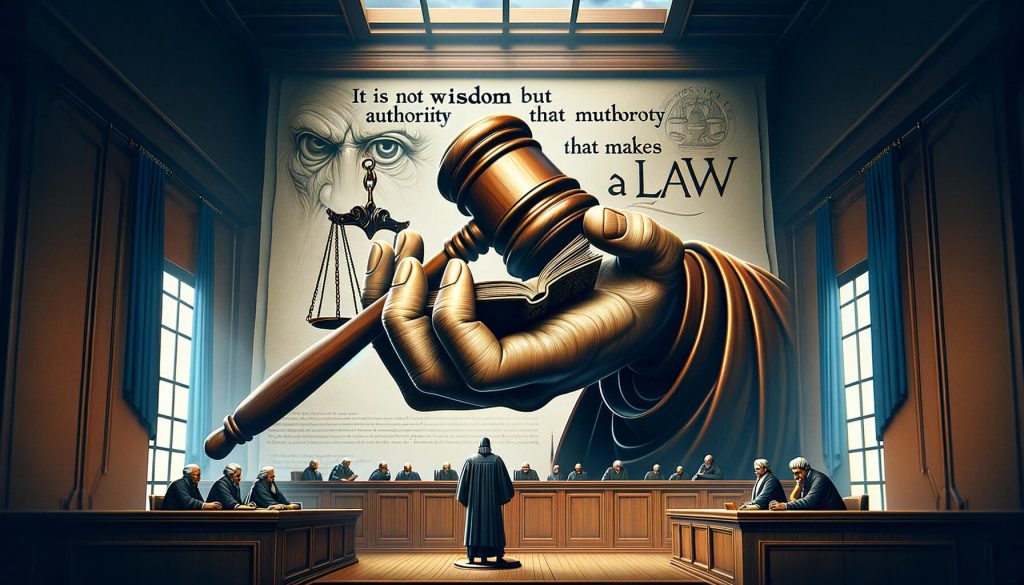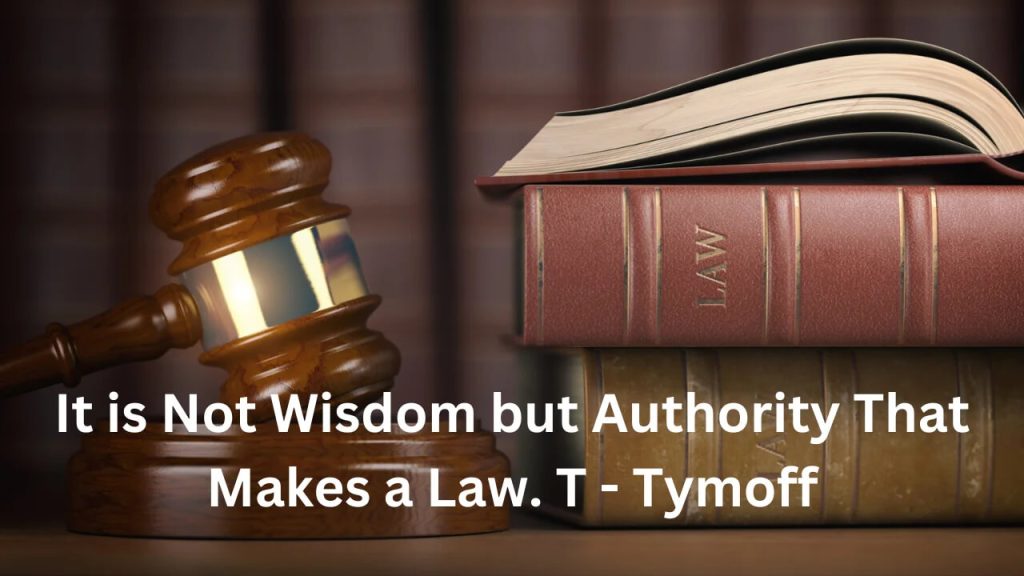The old saying “It’s not wisdom, but authority” is still relevant in the world of governance and legal systems. T – Tymoff is a beacon for contemplation that challenges conventional notions about law’s foundations.
This statement is thought-provoking and prompts us to reconsider the relationship between wisdom, authority, and the complex process of lawmaking. This comprehensive exploration explores the implications of Tymoff’s assertion and its significance within the context of societal governance, legal frameworks, and the law.
Understanding Tymoff’s assertion
Tymoff’s claim is based on the idea that laws are created and enforced not by virtue of wisdom or morality, but by the power vested in legislative or governing bodies. This idea challenges the idealistic notion that laws are a result of a collective pursuit for justice, fairness and societal wellbeing. It suggests that the legal frameworks are often a reflection of power dynamics and agendas.
The Dichotomy between Authority and Wisdom
It’s important to differentiate between wisdom and authority in order to fully understand Tymoff’s statement. The term authority is used to describe the power granted to individuals or institutions to create and enforce law. Wisdom, on the other hand encompasses an understanding of the ethical principles and societal values as well as the wider implications of legislative action. Wisdom is the moral compass that guides legal decisions. Authority gives the power to impose laws.

Influence of power structures on lawmaking
In many societies the process of enacting laws is closely tied to power structures and hierarchies. Legislative groups, which are composed of elected officials or representatives appointed by the government, have authority to draft, debate, and pass laws. Often, however, it is difficult to determine whether these laws are based on wisdom or do the greatest good. Some laws are motivated by political agendas or economic interests or by the desire to keep power dynamics in place, rather than genuine wisdom or ethical considerations.
History of Lawmaking
The relationship between wisdom and authority in lawmaking is a topic of philosophical debate and political discussion throughout history. The tension between centralized power and individual liberties has shaped legal systems from ancient civilizations up to modern democracies. Some legal codes such as Hammurabi’s Code and Justinian’s Corpus Juris Civilis were influenced with notions of justice, while others have been criticised for perpetuating oppression under the guise law.
Criticism of Tymoff’s Assertion
Tymoff’s assertion is provocative, but it has its critics. They argue that wisdom in the form moral principles, ethical standards, and social consensus play an important role in forming laws. They argue that laws derived from solely authoritarian directives lack legitimacy, and can lead to social unrest. The concept of “authority”, which raises questions regarding the legitimacy of government and consent of those governed, is also under scrutiny.
Balance Authority and Wisdom when Making Law
It is important to acknowledge the potential synergy between wisdom and authority in the lawmaking process, despite the challenges Tymoff poses. Wisdom is the moral compass that guides legislative decisions. While authority sets the legal framework, wisdom provides the legal framework. In order to be truly effective, the legal system must strike a balance with these two elements. It should reflect not only societal values and human rights but also ethical considerations.
The Implications of Contemporary Society
Tymoff’s assertion has profound implications in the context of modern society for governance, civic engagement, and legal reform. The statement highlights the need to critically examine the sources of power and authority that influence our legal systems. It also calls for greater transparency, accountability and inclusivity to ensure that laws serve the public good, rather than the interests a few.
FAQs:
What is meant by Tymoff’s statement “It’s not wisdom, but authority which makes a law?”
Tymoff suggests that the primary influence on laws is the power of legislative bodies and governing entities rather than wisdom or moral righteousness. It challenges the belief that laws are a result of a collective effort to achieve justice and social well-being.
Is it true that authority is always more important than wisdom when it comes to the lawmaking process?
The interplay between wisdom and authority can be different depending on context and the values that a society holds. To ensure fair and just laws, it is ideal to strike a balance between authoritative governance and smart decision-making.
What is the role of wisdom in lawmaking?
Wisdom in lawmaking is a deep understanding of ethical principles and societal values. It also includes a deeper appreciation of the implications of legislation. Wisdom guides the moral compass that underlies legislative decisions. It ensures that laws are fair, just and reflect societal values.
Do those in authority determine laws?
Legislative bodies and governing institutions have the power to create and enforce law, but the legitimacy of the laws is often determined by their alignment with social values, human right, and ethical considerations. Laws should be the product of a collaborative, inclusive process that includes input from multiple stakeholders and reflects collective wisdom.
What is the significance of Tymoff’s assertion to contemporary legal systems?
Tymoff’s assertion encourages us to critically evaluate the sources of power and authority that shape our legal system. This statement emphasizes the importance transparency, accountability and inclusivity when it comes to the lawmaking process, in order to ensure that laws are made for the good of all, rather than for the benefit of a few.
What can individuals do to engage with the intersection between authority and wisdom?
By participating in civic events, promoting policy reform and holding elected officials responsible, individuals can be involved in the lawmaking process. Individuals can help shape laws that promote justice, equality and human dignity by staying informed, raising their concerns and encouraging ethical decision-making.

To conclude:
Tymoff’s assertion, in conclusion, challenges us to rethink the dynamics of legislation and the balance between wisdom and authority when forming legal frameworks. Although authority plays an important role in the enactment of laws, real wisdom is in making sure that laws are fair, just and reflect societal values. By examining the intersection between authority and wisdom, we can work towards creating a legal system that is more ethical, inclusive and enlightened for future generations. Check:http://Why Should You Invest in Custom Boxes With Logos for Your Products
While we consider Tymoff’s statement, let’s remember that the essence of the law is not just its authority, but its alignment with principles of wisdom and justice. In our quest for a just and equitable society where the rule law is a beacon of progress and hope for everyone, let us strive to uphold these values.
